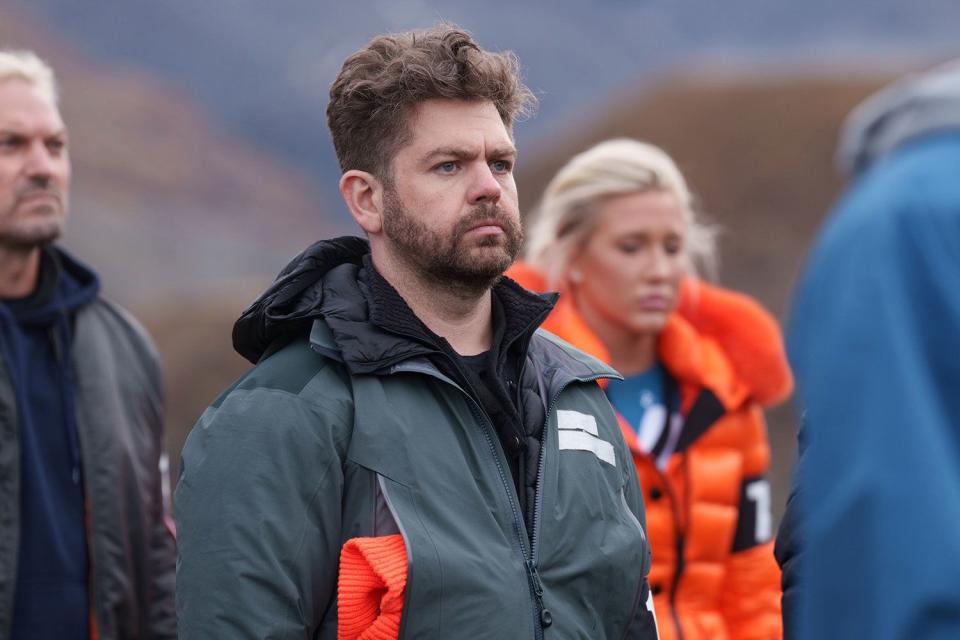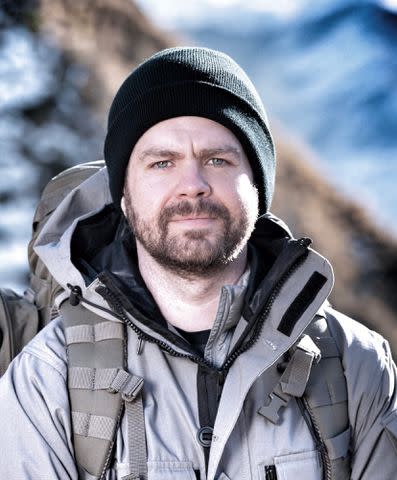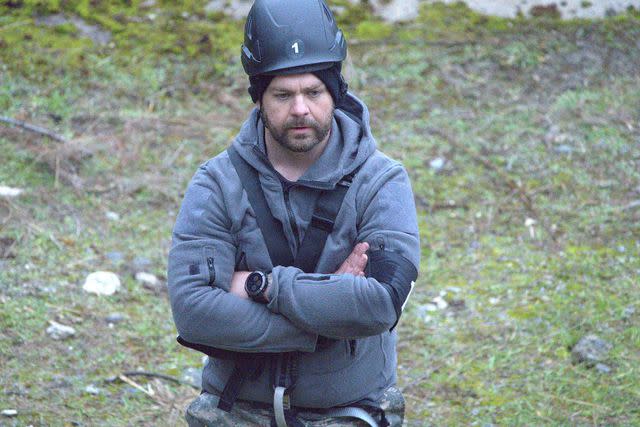Jack Osbourne discusses his heart-pounding exit from “Special Forces”: 'It wasn't on my terms, so I feel robbed'
- Oops!Something went wrong.Please try again later.
- Oops!Something went wrong.Please try again later.
The Osbournes star tells EW about his medical withdrawal: "The show needs people to drop."

Warning: This article contains spoilers for Special Forces: World's Toughest Test season 2 episode 6.
Jack Osbourne endured six episodes of Special Forces: World's Toughest Test this season, only to be medically withdrawn due to concerns over his elevated heart rate. Osbourne was diagnosed with multiple sclerosis at age 26 in 2012, so the show's medic was particularly alarmed to learn of the Osbournes star's situation (at one point, the doctor warned that "He could keel over and die if there's something underneath going on with him"). Below, Osbourne speaks with EW about his time on the grueling reality competition.
ENTERTAINMENT WEEKLY: What was that like transitioning back to normal life after you concluded your time on Special Forces?
JACK OSBOURNE: It was pretty seamless. I've got four kids, so the moment you get home it's just right back into the routine. So I think that helped. But I was bummed and I'm still bummed I had to leave the show the way that I left. It wasn't on my terms, so I feel robbed of it. If they would've called me asking, "You want to do season 3?" I'd be like, "f--- yes."
This show is one of the most, if not the most physically rigorous reality shows on the air. What made you want to join Special Forces initially?
I was a fan of the show when it was out in the U.K., so when I heard they were doing an American version, I wanted to do it. I like all this stuff. I love challenges like this. I've done various selection, simulated-type endurance events before, so it was just something that I gravitated towards.
How did the physical challenges of the series compare to your expectations going into the shoot?
As much as I love the show, they do a terrible job actually showing the truly physical stuff. The challenge is more mind games than anything. I think they put a lot of focus on those challenges because they're cinematic and there's explosions and they have drones, so it makes for good TV. But the real tough stuff is the fact that everywhere we went off the base, we had those 15 kilo backpacks on us at all times. You're not allowed to walk anywhere, so you're running, and that takes a toll. And then the amount of abuse that they fire off at us, it never ends. So there's a lot between the challenges that is just soul crushing, and you don't really get a true sense of it.

If you could narrow it down, what would you say was the single most challenging element of the show?
The toughest thing for me was the calm before the storm, because you can never truly relax. You're on edge the entire time with zero distractions. I think as a society we're so used to distracting ourselves, whether it's with TV, phones, computers, magazines, whatever. Just having that distraction to turn off your mind is important, and it just wasn't there. There was a time we'd gotten our asses handed to us, and I went and sat on a box out in front. And I just remember just sitting there just being like, "I dunno how to turn my head off."
That's brutal. Of the specific physical challenges that made it into the final cut of the show, which did you have the most trouble with?
Oh, I totally sucked on the rope. They cut it out, but I pinched my nut on the rope, and that's why I fell off, because my nut got squeezed between my harness and the rope. And I was like, "Ah!" I jolted, and that's why they cut it out. They were like, "You sucked at that." And I was like, "Yeah, that was just not my vibe."
I'm so sorry to hear that, that's horrible! Going into the show, did your doctors express concern about your ability to participate before it started?
Not really! The show's doctors were more concerned than I was. I'm pretty healthy considering I'm living with MS, but it doesn't present itself daily for me. I've been, touch wood, going pretty strong and I don't have any issues with it right now. So that wasn't a concern.
The heart thing, the reason why I ended up getting medically dropped, was a shock for me. It's funny, one of my best friends is a retired special forces medic, and he called me the other day and asked what happened, and I explained that my heart rate just wasn't going down. And he says, "Oh, you were just potassium deficient. That's common with selection. Literally all they would've had to do is just give you a bunch of bananas or a potassium supplement and it would've lowered your heart rate."
Why didn't the medical personnel on the show give you those, then? Why couldn't they recognize the potassium deficiency?
If I'm putting my producer hat on, the show needs people to drop. The medic on the show, he's a real doctor. He could give us whatever medicine he wanted, but it doesn't make for good TV if we get patched up and go back in the fight. They need people to leave. So it's kind of a kiss of death when you go see the doctor on that show, even if it's something minor. But at the end of the day, whether it was a potassium deficiency or not, they were just erring on the side of caution. My heart rate didn't drop below 90 beats per minute for days. Ultimately I don't want to die for a TV show, so I'm glad they took that approach, but it was still very frustrating.
Did you get the sense that the producers behind the show were at all surprised by how many people made it as far as they did? The rate of dropouts was a lot slower than on the first season.
One hundred percent. And that's why they kept ramping it up. We'd be doing challenges and I would see who I'm guessing were the show runners talking to the DSS, and then all of a sudden they would come back and just destroy the s--- out of us. I think they were surprised that the final group in these last few episodes had such tough people mentally and physically. I don't think they expected the collective group's ability to take the pain and the anxiety and the suffering and just power through.

Are you still in touch with any of your costars from the show?
Oh yeah. Nick Viall and Kelly Rizzo were at my house over the weekend. I had a little birthday gathering, so they stopped by, and we all text. The people that live in L.A. are all on a chain, and we've gone over to people's houses to watch the show together. And I've been in touch with some of the DSS, so it's cool.
A few years ago, you talked about how you had reached out to Selma Blair after her MS diagnosis, and you've called her an inspiration for how publicly she's shared about her journey. Did the two of you ever discuss your time on Dancing With the Stars?
One of the last times I ran into Selma Blair was, just coincidentally, the week after she had to pull out of Dancing With the Stars. I saw her at coffee with Sasha [Farber], her dance pro, and we sat and we chatted for a good hour and caught up. She's got a strong head on her shoulders, and I think it's great that given her journey with MS and how tough it's been for her, she's clearly not letting it stop her. She's really pushing through it and doing all she can. She's awesome.
What's the most important message that you want other people with MS or other chronic illnesses to hear?
I think the important message is: obviously take on board what the doctors are telling you, but understand that MS is as unique to the individual that has it as their own fingerprint. In my experience, medical professionals will deal in the kind of average, "Oh, well, this is what most likely will happen. This is the average patient with MS." But it's different for everyone. So you've got to find what your baseline is. For me, I know what I need, I know what I require. I know, and it's taken time, and I've been able to maintain my physicality as best I can.
The other most important thing is to communicate about it, because mental health issues are a huge component when you have multiple sclerosis, and it's something that gets overlooked because it's not necessarily an outward physical issue. That's the internal side of it, and that weighs heavy.
This interview has been edited for length and clarity.
Special Forces: World's Toughest Test airs Monday at 9 p.m. ET/PT on Fox. Watch the exclusive clip from tonight's new episode above.
Sign up for Entertainment Weekly's free daily newsletter to get breaking TV news, exclusive first looks, recaps, reviews, interviews with your favorite stars, and more.
Related content:
See every celebrity who's left Special Forces: World's Toughest Test season 2 so far
Watch Tara Reid break down in Special Forces sneak peek: 'It's not fair, I'm really in pain!'
JoJo Siwa flexes with Bachelor Nation bros Nick Viall and Tyler Cameron: 'Chosen family'
Read the original article on Entertainment Weekly.

